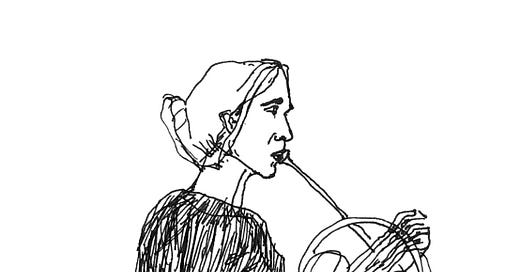Great Expectations
Music education at my old school is sharp; why has the rest of school gone flat?
Last week I started a new internship at a recording studio. In the space of a few hours I had sponged up so much new information that I got a mild headache. I learned how to set up microphones, how to distinguish a 57 from a 58, and when to use a mic with a cardioid sound pattern, when a figure-8 or an omni. I learned (in theory) how to mix a podcast, pasting in different takes and adding crossfades to cover edits, excising the likes and ums from natural speech. I learned—just like in the movies—how to record the voices and instruments using the sound board. With no prior knowledge, and a dearth of technical skills, I was able to learn on the job—with a great teacher.
This is the key: students will rise to the expectations teachers have of them. This is how a charismatic, firm, meticulous teacher can elicit excellent results from untrained pupils.
At my local high school—you know, the one I left to pursue education at home—there is a long tradition of excellence in music education, especially in band ensembles. In the postwar era, Ithaca High School was “one of the most important High Schools in the world for music,” Ben Crocker (a current Research Fellow in Music Studies at Common Sense Society) tells me. In those days the school band was led by Frank Battisti, who went on to teach at New England Conservatory of Music. Battisti “started by putting on humble school assembly concerts and eventually grew the school's music program to worldwide fame. He was particularly adept at convincing world class composers to write music for the high school kids.” From 1958 to 67, he commissioned twenty four works for the wind ensemble, from Carlos Chavez (once director of the Mexican Symphonic Orchestra) to Pulitzer for Music-winning Hunther Schuller. Under his direction, the band performed at Eastman, Rockefeller Center, and the World’s Fair—and several times with Benny Goodman.
Today the IHS Band thrives under Nicki Zawel. My best friend, Juju Crane, is the Band President this year. She’s first French horn in the Wind Ensemble (and also happens to be a concert-level cellist). “An Ithaca College professor told Mrs. Zawel we sound better than their band,” she reported. The reason? The conductor: “It’s cuz Mrs. Zawel is so good.” Juju’s previous French horn instructor, Michael Allen, had a long and illustrious career at Boynton Middle School. He still watches her concerts.
While music education in our public schools (bolstered by nearby Ithaca College and Cornell) still flourishes, the study of literature, under less stringent requirements for excellence, languishes. Students can graduate from high school without ever having been required to write an academic essay on a work of fiction. When I worked for the school newspaper, I heard staff writers celebrate that they hadn’t read a book for pleasure since elementary school. I’ve heard Cornell students publicly vaunt the possibility of never needing to read or write in some majors. I’m looking at you, computer science department!
Slowing, flattening, or leveling humanities curricula (taking away books and essays, replacing them with feeling-based discussions) is the explicit aim of most schools now. What student wouldn’t take the chance to sail through school without the labor of writing, unless excited by the prospect of high-stakes accountability and a chance to impress? Let’s learn from the Battistis, Allens, and Zawels of the world: great expectations will produce great results.




